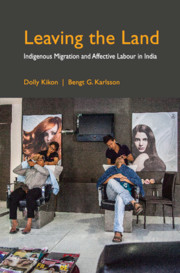Conclusion
Published online by Cambridge University Press: 04 May 2019
Summary
It is significant that the phenomenon of indigenous migration is as diverse as the individual communities involved.
– Carlos Y. A. Trujano, Indigenous Routes, 2008For two days, the 25th and 26th of February 2016, ministers, senior government officers, scholars, and business people gathered in the posh, newly built, five-star Radisson Blu hotel – situated on the outskirts of Guwahati, close to the airport – for the international ‘Advantage North East India’ conference on the potential of the service sector in Northeast India. At these types of government-sponsored events in and on Northeast India, speakers tend to focus on the untapped potential of the region. It was also the case during these two days. However, instead of focusing on the natural resources that could be tapped, this conference was focused on the untapped human resources. As stated, the estimated rate of creation of new jobs in Northeast India will not be able to keep up with the number of young people graduating from schools and colleges in need of jobs. The good news, though, is that the level of education and more importantly fluency in English among these young people are comparatively high. This speaks, as the organizers pitched it, to a potential for young people to get employed elsewhere in India or abroad.
The person at the conference who most elaborately described such potential was the chief guest from Thailand, Professor P. S. Narula. He compared the people of Northeast India to an ‘unpolished diamond’ in terms of skills and service potential. According to Professor Narula, people from Northeast India and Thailand are similar. They share the same qualities, or as he puts it, both possess ‘an inborn quality to put up a smile and to extend hospitality’. It is a matter of passion, he stated with emphasis. And as Professor Narula explained further, being passionate about one's work is critical in the service industry. If you go to work seven days a week and you are always on time and you do not keep looking at the clock for the shift to end, then there is passion.
In this book, we have engaged with the ongoing movement of indigenous youths from the Northeastern borderlands to metropolitan cities in mainland India and further abroad.
- Type
- Chapter
- Information
- Leaving the LandIndigenous Migration and Affective Labour in India, pp. 129 - 133Publisher: Cambridge University PressPrint publication year: 2019

